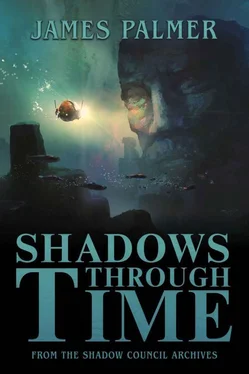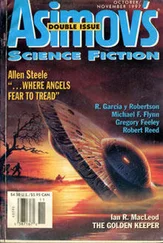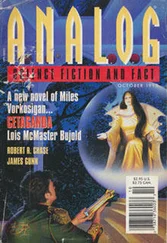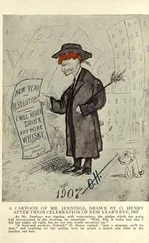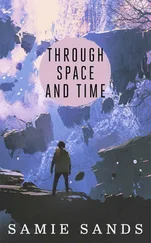“Splendid,” said Herbert. “Let’s test it out then. I’ve wired the Nautilus into my Time Machine. It is our hope that this will allow the Nautilus to travel into the distant past, there to witness this troublesome landmass the last time it was above the surface of the ocean.”
“For what purpose?” asked Challenger.
“To see what we are up against,” said Nemo. “To learn the cause of this madness affecting the world. And this vessel.” He looked each of them in the eye. “I know we’ve all had troubled sleep. Whatever is rising up from the bottom of the ocean at these coordinates is the cause. If we know more about it, we might be able to stop it.”
“It sounds as if you want to stop nature itself,” said Challenger.
“Is it nature that mankind be exterminated?” asked Nemo. “Is it natural to be slaughtered by the Deep Ones?”
Challenger stared down Nemo.
“Gentlemen, please,” said Miss Marsh. “This posturing will get us nowhere.”
“The proof is in the pudding,” Burton added. “Let’s see if Herbert’s Time Machine works.”
Challenger nodded and stepped away from Captain Nemo.
“Very well then,” said Herbert. “Follow me.”
The Time Machine was stored in a rather small area near what Burton assumed was the engine room. A peculiar instrument consisting of a cushioned, high-backed chair inside a brass frame, behind which sat a large dish suspended vertically. Herbert stepped over to it. “The Time Machine is operated by these two levers,” he said, removing two shafts of some crystal from his pocket. “One controls the machine’s direction through Time, and the other its speed. I remove them to prevent someone other than the operator from activating the machine.”
He carefully screwed them in place, then climbed over the frame and sat down, his hands on the levers.
“I don’t have a precise destination in mind,” said Nemo. “But I know we must travel hundreds of thousands of years into the past. The four of us will go to the observation deck, which affords an ample ocean view, while Herbert remains here, piloting the time machine. I will communicate with him via the speaking tube positioned just over his head, telling him when to speed up, slow down, or stop.”
“The engines have ceased then?” asked Herbert.
“I have ordered full stop an hour ago. Our forward momentum has ceased.”
“Excellent,” Herbert said. “I’m ready when you are.”
Burton, Elizabeth Marsh, and Professor Challenger accompanied Captain Nemo to what he called the forward observation gallery, a grand compartment fitted with padded seats and fronted by a thick pane of glass, through which the limitless ocean could be viewed. The current scene was quite hellish. Streak of molten red zigzagged along the ocean floor, while columns of thick black smoke billowed out. Burton watched, amazed, as tendrils of hot lava oozed out and were instantly cooled by seawater and turned black and semi-hard.
“I have seen islands form in just this very fashion,” declared Nemo. “But what we’re witnessing here is not the cause of a great change, merely a symptom. Look.”
Nemo pointed, and through the ocean’s gloom, he could see some huge shape rising up on columns of molten rock, being lifted off the ocean floor after untold eons.
“Is everyone ready?” came a tinny voice.
Nemo leaned toward a brass pipe rising from the floor next to his seat and spoke into its flared end. “We are ready. You may begin at once.”
“Very well,” came Herbert’s thin reply. “I suggest you hang onto something. The journey can be jarring at times. Here we go.”
At first, Burton noticed nothing, though he didn’t have the foggiest idea what he should expect. Embarking into new territory, he smiled at the idea of being a chrononaut—and among the world’s first.
Then, he noticed something strange about the shifting underwater landforms. The glowing lava tendrils that had had him so transfixed were moving backward. First cooling cinders, then molten worms being pulled back down into the earth. Landmasses swelled and shrank. These processes repeated, over and over, faster and faster. He grew dizzy and steeled himself against his padded seat.
The light shifted with great rapidity, brightening and dimming. He saw schools of fish swimming backward, chasing their predators. The landmass that had been rising up before them fell back down into the ocean depths. Molten scars sealed and subsided.
“Faster, Herbert, if you please,” said Captain Nemo.
For a time it seemed as if nothing changed, just that rapid brightening and dimming of the distant surface light. Burton squeezed his eyes shut for a moment to steady himself. When he opened them again, the ocean depths crawled with life.
Challenger gasped. Large beasts sped past the viewing port, moving backwards. Burton watched as a squid as long as the Nautilus disgorged a giant fish from its beaked maw, the bloody pieces knitting themselves back together before the now living creature chased the squid backward and out of sight. A multitude of fish and other sea creatures, many of which were unknown to current science, sped past in similar fashion.
Several times, Burton glanced at the carpeted floor to focus on something that wasn’t moving. But it was moving nevertheless, he realized. The Nautilus was moving backward through Time itself. Just the thought of it took his breath. It wasn’t logical. It wasn’t possible. But here he was. His friends at the Cannibal Club would not believe a word of this adventure. His thoughts of his friends back home reminded him of poor Speke.
Ph’nglui mglw’nafh Cthulhu R’lyeh wgah’nagl fhtagn!
Speke, who must have been looking for something more than the source of the Nile. Some dark secret out of Time itself.
Ph’nglui mglw’nafh Cthulhu R’lyeh wgah’nagl fhtagn!
“In his house at R’lyeh, dead Cthulhu waits dreaming.”
“What?” said Challenger, who sat next to him.
Burton looked at him, startled. He hadn’t realized he’d said anything aloud.
“Nothing.”
“Faster,” ordered Nemo.
The sickening feeling increased. Burton watched as countless sea creatures moved from death to life, rising from where they had fallen and swimming away. Veritable herds of some large, bony-looking insect things scurried about on the bottom. “Trilobites,” said Challenger. “Oh, to have a living specimen for my museum!”
Backward they went through Time, the pace quickened now. They watched as once again the molten tumult that was occurring in their own time period returned, launching a vast landmass up and out, the long, slow volcanic processes that had created it taking place for them in a matter of seconds.
“Forward now,” ordered Nemo. “We’ve gone too far back.”
The disconcerting backward view slowed and stopped, then started again in reverse. Now they were moving forward, hurtling past geologic ages in an instant. Now Burton could witness birth and death in their proper order, though with the same terrifying swiftness.
“Slow to a stop,” said Nemo.
The dizzying quickness of Time slowed and came to a full stop. They were now at one fixed point in Time.
“When are we?” Nemo asked Herbert through the speaking tube.
“An exact year would be meaningless,” said Herbert. “But we are in the depths of the Pleistocene Epoch, roughly one hundred and twenty-eight thousand years before our time.”
“Well,” said Challenger with a sneering grin. “Let’s go out and meet the neighbors, shall we?”
“Herbert, is the Time Machine unharmed?” asked Captain Nemo.
Читать дальше
